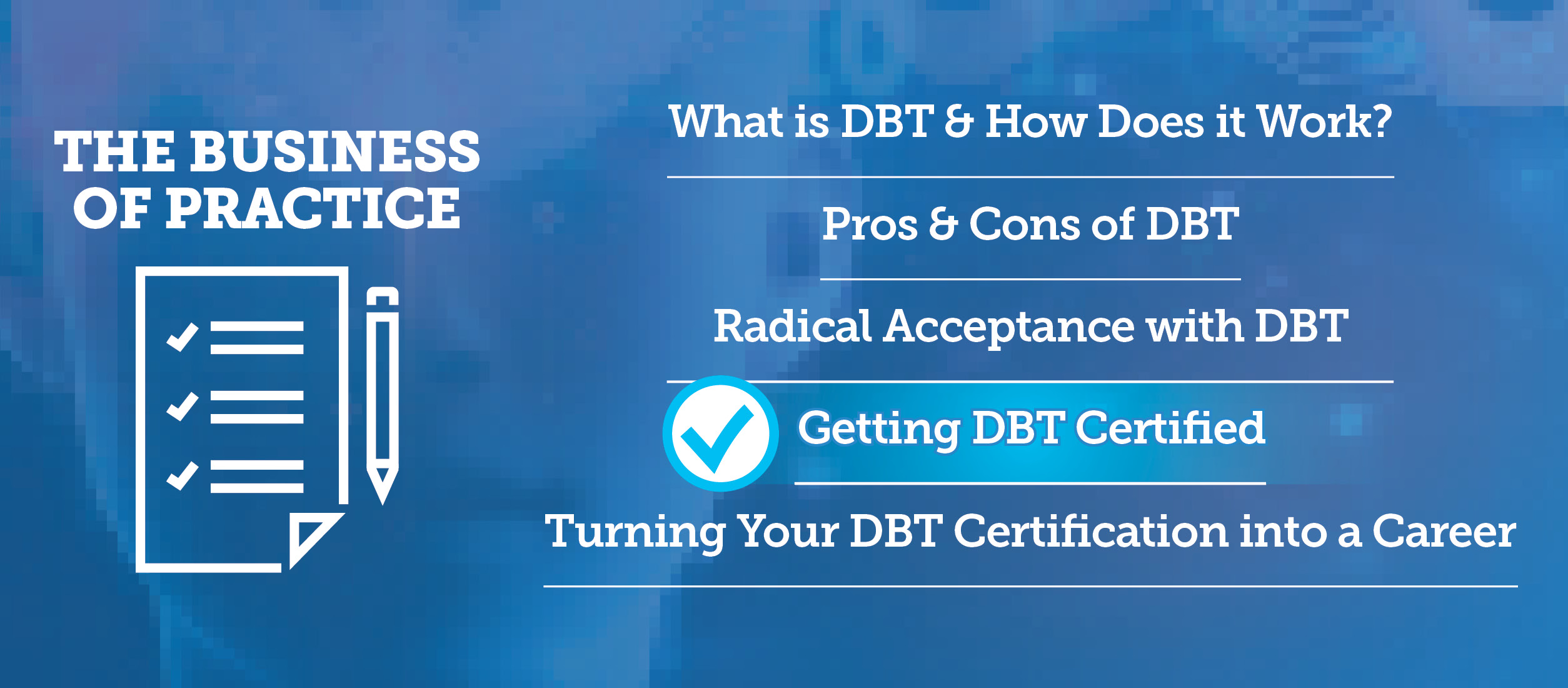Why Get Certified?
Gain expertise in a meaningful area you care about and help propel your mental health career forward. Clinicians and agencies will benefit from certification as it demonstrates dedication and acknowledges hard work that is expended in learning and, subsequently, applying a new treatment, assessment measure, or skill. For those searching for a mental health professional, certification provides consumers with confidence that they will be working with a professional who will give considerable care to them.
Why Get DBT Certified?
Dialectical Behavior Therapy (DBT) is a comprehensive cognitive-behavioral treatment that is increasingly being used in various health settings. All of CONCEPT’s DBT training programs can improve clinical skills. In addition, DBT skills training allows mental health providers to assist their patients with reducing problem behaviors.
DBT can stabilize a milieu by employing eastern principles of acceptance and compassion paired with behaviorism techniques and can assist in decreasing burnout.
Lastly, as many individuals are afraid of change, mental health professionals must assist them in developing the capability to change certain aspects of themselves and at the same time identify parts of themselves and others that they cannot change.
By earning CONCEPT’s DBT training certificate, professionals can learn how to balance change-based technology (via behavior therapy) with acceptance-based principles (via validation). This dialect will assist patients in developing more functional behaviors and help them apply these in real-world situations. For more information see our post turning your DBT certification into a career.
How DBT Training Certification Can Help Enhance Your Career.
1. DBT Certification allows clinicians who wish to join an existing DBT team to do so! Clinicians can step right into working in a comprehensive DBT program providing services with full fidelity.
2. Some agencies that provide comprehensive DBT hire clinicians for contract work offering competitive compensation.
3. Experience and training when applying to a clinical DBT job is often preferred. Certification saves the agency time and money when they do not have to train a clinician.
4. The evidence-based nature of DBT makes it appealing to funders when trying to secure grant money.
5. Increase your client load and ensure dependable income with DBT certification.
6. Highly motivated clinicians can create their own DBT comprehensive teams!
What if I’m on a DBT Team and We Want to Expand?
CONCEPT's on-demand professional DBT Training certification is an excellent means of training new team members and milieu/line staff and strengthening existing team members’ therapeutic skills.
In addition, the DBT certification will provide mental health professionals with a thorough training on Comprehensive DBT, wide-spread DBT skills training, and a review of specific adaptations and strategies practical with a variety of adult and juvenile settings (e.g., jails/prisons, forensic hospitals, juvenile justice settings, probation). Our advanced training offers content to improve the effectiveness of DBT consultation teams, increasing its effectiveness and team cohesion.
What the Certification Involves
The courses in CONCEPT’s DBT certification are appropriate for all clinicians, from early career professionals to more experienced ones. Mental health professionals can be working on obtaining licensure concurrently while completing the didactic program materials if they are working in a facility where they are administering DBT.
However, it is important that participants are aware they must be part of a comprehensive DBT team to complete the consultation aspect of the certification. In addition, DBT providers must be licensed to practice therapy in the state where they are intending to practice, prior to officially earning CONCEPT’s DBT certification.
This certification has three levels.
Level one is foundational, it entails 10 hours of didactic training introducing the theoretical and empirical foundations for DBT and 10 hours of didactics on the specific adaptations and strategies beneficial for adults and juveniles in forensic settings.
Level two entails additional didactic material, demonstrating academic competence in DBT. Participants will complete 20 hours of DBT Skill training, learning how to leverage four essential skills to help patients manage painful conflicts, including mindfulness, distress tolerance, emotion regulation, and interpersonal effectiveness.
Moreover, DBT providers must help patients identify and implement adaptive solutions (i.e., DBT skills) to cope with or solve a problem, that they feel they cannot change or tolerate; therefore, the next 10 hours of program work entails learning how to assess and manage suicidal clients. DBT has several unique aspects (e.g., levels of validation, commitment agreements, consultation team, telephone skills coaching, and crisis calls... to name a few), each of these aspects are reviewed in detail throughout the last 30 hours. These remaining didactic hours are broken up into three 10-hour modules where role-playing, clinical case examples, and dialogue between in-person trainees and Dr. Galietta fosters an interactive experience to accommodate different learning preferences and consolidate clinical knowledge. Our 80 hours of didactic work includes homework assignments and mindfulness exercises that arm you with experience to better understand the experience of your patients when assigned to them.
After the 80 hours of didactic coursework is completed, clinicians will complete a multiple-choice exam on the DBT training material. Clinicians will then apply for level 3 to demonstrate clinical competence.
Throughout level 3, mental health professionals will engage in six months of consultation sessions with a certified DBT therapist to assess implementation and adherence to the treatment model. Throughout these six months, attendees will submit de-identified diary cards, documentation of skills group and consultation team, weekly summaries, and review individual therapy sessions. The consultation aspect of our certification program offers you tailored feedback to excel your clinical skills and ensure you are implementing DBT with fidelity. After the rigorous DBT training, clinicians will be certified DBT providers.Where Can I Get My DBT Certification?
CONCEPT Continuing and Professional Studies at Palo Alto University provides mental health professionals with an online, evidence-based certification option. Along with our DBT certification, we offer several other psychology certificates and certifications. If you’re ready to enhance your career, contact us for more information about our programs today.






















